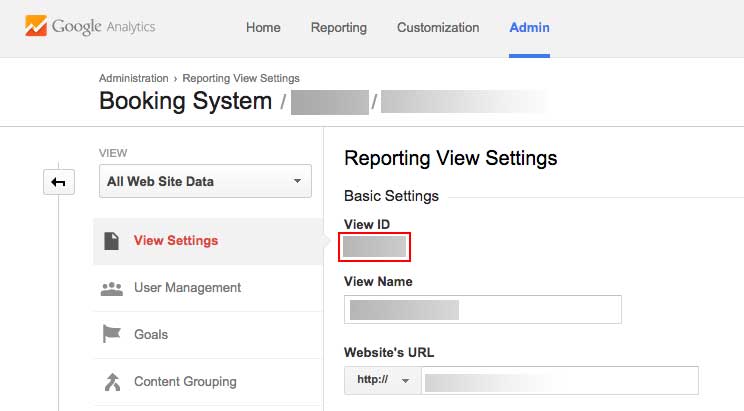ga-api v0.0.5
ga-api
Google Analytics API access, with automated concurrency limiting and optional request caching.
Installation
npm install ga-api --saveFeatures
- Concurrent requests limiting (GA allows 10 by default, and we retry on 403s)
- Caching of requests (optional and configurable)
- Loosely based on this.
Authenticating
Before using the library, setup the google service account as described in the link, then grab the following information:
- clientId: "CLIENTID.apps.googleusercontent.com"
- email: "CLIENTID@developer.gserviceaccount.com" - you must add a service email here, for the correct view.
- key: "PATH/TO/PRIVATE.KEY.FILENAME.pem", as described here
- ids: The view ID(s), eg: "ga:VIEWID"
You can find the client ID and Email in the google developers console here (after creating it):

And the view ID in the google analytics console here:

So you end up with something like:
var options = {
clientId: "clientidisalongandseeminglyrandomstringofcharacters.apps.googleusercontent.com",
email: "clientidisalongandseeminglyrandomstringofcharacters@developer.gserviceaccount.com",
key: "google-service-private-key.pem",
ids: "ga:12345678"
};Usage
gaApi(args, callBack, settings)Where:
- args - all the authentication settings plus query parameters
- callBack - a function that can take an
errorand aresultargument - settings - an optional settings object where you can override the default settings
args
- startDate - (YYYY-MM-DD), eg: 2015-05-21
- endDate - (YYYY-MM-DD), eg: 2015-05-28
- metrics - any metric to include, eg: "ga:session"
- filters - any filtering you wnat, eg: "ga:pagePath=~/Home"
- dimensions - any dimensions you like, eg: "ga:source"
- maxResults - maximum number of results to return, eg: 100
- startIndex - offset to start from to allow paging, eg: 1, 101
- sort - what to sort by, eg: "ga:source"
The args must also include the Authentication information from above, ie: clientId, email, key and ids.
callBack
This function receives an error object and the resulting data from your query, i.e:
function(error, result) {
if(error) throw error;
// Do something with result here
}settings
The settings can optionally override some deafult settings, these include:
- cache - time in ms for caching requests, default is 0, ie: no cache
- cacheDir - directory to save the cache - uses system temp dir by default (process.env.TMPDIR)
- concurrentLimit - maximum concurrent requests - default is 10 (which is what Google set by default)
- concurrentDelay - how long to delay if we get a 403 error, default is 1000ms
- concurrentMaxRetry - how many times to retry after a 403 error - default is 3
Example
var options = {...authentication info from above...},
gaApi = require('ga-api');
gaApi(_.extend({}, options, {
startDate: "2015-06-03",
endDate: "2015-06-10",
dimensions: "ga:affiliation,ga:date",
metrics: "ga:revenuePerTransaction"
}), function(err, data) {
console.log(data);
});The resulting data will look something like this:
{ kind: 'analytics#gaData',
id: 'https://www.googleapis.com/analytics/v3/data/ga?ids=ga:XXXXXXXX&dimensions=ga:affiliation,ga:date&metrics=ga:revenuePerTransaction&sort=ga:affiliation&start-date=2015-06-03&end-date=2015-06-10',
query:
{ 'start-date': '2015-06-03',
'end-date': '2015-06-10',
ids: 'ga:XXXXXXXX',
dimensions: 'ga:affiliation,ga:date',
metrics: [ 'ga:revenuePerTransaction' ],
sort: [ 'ga:affiliation' ],
'start-index': 1,
'max-results': 1000 },
itemsPerPage: 1000,
totalResults: 32,
selfLink: 'https://www.googleapis.com/analytics/v3/data/ga?ids=ga:XXXXXXXX&dimensions=ga:affiliation,ga:date&metrics=ga:revenuePerTransaction&sort=ga:affiliation&start-date=2015-06-03&end-date=2015-06-10',
profileInfo:
{ profileId: 'XXXXXXXX',
accountId: 'XXXXXXXX',
webPropertyId: 'UA-XXXXXXXX-2',
internalWebPropertyId: 'XXXXXXXX',
profileName: 'Web data',
tableId: 'ga:XXXXXXXX' },
containsSampledData: false,
columnHeaders:
[ { name: 'ga:affiliation',
columnType: 'DIMENSION',
dataType: 'STRING' },
{ name: 'ga:date', columnType: 'DIMENSION', dataType: 'STRING' },
{ name: 'ga:revenuePerTransaction',
columnType: 'METRIC',
dataType: 'CURRENCY' } ],
totalsForAllResults: { 'ga:revenuePerTransaction': '123.456' },
rows:
[ [ 'SOURCE1', '20150603', '12.34' ],
[ 'SOURCE1', '20150604', '56.78' ],
[ 'SOURCE2', '20150603', '90.12' ],
[ 'SOURCE2', '20150604', '34.56' ],
[ 'SOURCE3', '20150603', '78.90' ],
[ 'SOURCE3', '20150605', '12.34' ],
}So essentially the "rows" attribute of the data object will have what you want.
https://developers.google.com/analytics/devguides/reporting/core/dimsmets
for examples of dimensions and metrics